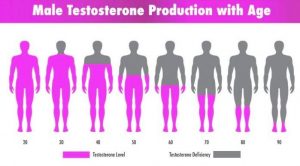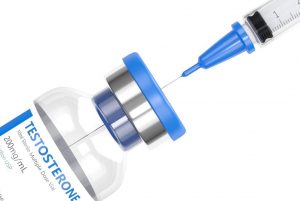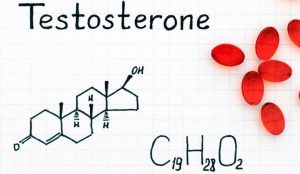
What is testosterone? Let’s start with the basics. Testosterone is a male hormone. Interestingly, the female body also cannot function without testosterone and produces it, of course in smaller amounts, in the adrenal glands.
In young men, testosterone is primarily responsible for the development of male sexual characteristics and the reproductive system, i.e. the penis, testicles, scrotum, prostate, and seminal vesicles. It also turns out to be important for the development of secondary sexual characteristics, such as increased muscle mass, facial hair, fat distribution, thickening of the vocal cords, musculature, and bone mass. Finally, it makes us feel sexual desire and allows us to get erections. With age, the level of testosterone in the body decreases – it is the highest in adolescence.

The amount of testosterone produced in our body depends primarily on genetic conditions. In an adult male, the testes produce 4 to 7 mg of testosterone every day, but its concentration in the blood is influenced by many factors, such as experienced emotions or current health. What’s the standard? Testosterone should be kept at 2.2 to 9.8 ng/ml of blood. If you want to check what it looks like for you, ask your doctor for a referral for a blood testosterone test. They are carried out as usual morphology.
Low testosterone
As we have already said, testosterone levels decline with age – from the age of 25, it gradually drops. This process can proceed at a different pace. Here are the low testosterone symptoms:
- Living under permanent stress
- Alcohol abuse
- Smoking
- Diabetes
- Atherosclerosis
- Testicular diseases
What happens to the male body when testosterone is too low? The first and most visible symptom changes in the figure, which begins to take on a female shape. You can see the rounding of the hips as well as the contours of the breasts and stomach.

Testosterone
The testicles also get smaller and the hair starts to thin. Decreased interest in sex or a complete lack of desire for love games is also directly related to low testosterone. In addition, there may be mental problems such as prolonged states of apathy, chronic fatigue, low self-esteem, and irritability. There is also significant muscle weakness.
Increased testosterone
However, this is not the only problem that may occur. With this hormone, balance is extremely important. Admittedly, for many guys, high testosterone is a reason to be proud – they are strong, have an enviable figure. It seems that there is never too much testosterone!
The biggest problem that is directly related to increased testosterone is the decrease in the body’s immunity. The mechanism is simple – cells that protect the body against disease do not withstand the clash with testosterone.
The male body is therefore unable to produce antibodies in the amount needed to fight external microorganisms. This makes both minor infections and more serious illnesses much more difficult for men with high testosterone. Another consequence of the elevated testosterone level is neurological problems, such as memory impairment, recurrent headaches, and dizziness, as well as mood swings and sleep problems.

Some men who train in the gym decide to use additional testosterone supplementation to increase strength and accelerate muscle growth. This action is very risky – any interference in the level of this hormone may turn out to be deplorable and very difficult to reverse.
Exercises to boost testosterone
In fact, every move affects its level. All you need to do is provide your body with regular stimuli in the form of exercise, and the testosterone concentration in your blood will increase. Nevertheless, it’s not about doing it thoughtlessly. Which exercise is best for my testosterone levels? Use testosterone booster if you need it.
While conditioning exercises are not as effective at regulating testosterone, you shouldn’t give them up. A good training plan that will improve your well-being and give you better health is essential. Therefore, you should remember about cardio, as it has the best effect on the work of the circulatory system. In turn, the level of testosterone is much better influenced by strength exercises, which should be performed according to the following rules:
- Engage many muscle groups at the same time
- Perform fewer repetitions, but increasing the load and improving the technique
- Choose circuit training, because it does not provide for breaks during the series (or you can simply shorten the rest breaks in your training)
- Do not overtrain (remember about regeneration!)
The best solution will be training under the supervision of a personal trainer (we invite you to a free consultation, which we organize every month), who will look at your training plan with a professional eye and list exercises and breaks appropriate to your level (shortening them or switching to circuit training does not mean resignation).

Remember that strength training should not last longer than 90 minutes. You should remember that the best testosterone booster in your body after the gym and a proper diet plan.
How to set up a diet?
Of course, when it comes to testosterone, it is impossible to ignore the issue of diet, which can significantly help in increasing/maintaining the concentration of this hormone in the body at the right level. Here are the products to help you with this:
- Lean meat – poultry, but also red
- Sea fish (rich in omega-3 acids)
- Linseed oil and olive oil
- Dairy products
- Whole grain and cereal products
- Eggs
- Beans, cauliflower, cabbage, broccoli, Brussels sprouts
Low testosterone is a problem so you should use boosters and make exercises. And don’t forget about the testosterone supplements.
Testosterone in women
Although testosterone is clearly associated with masculinity, it can also be found in the female body. Although it is present in much smaller amounts, it is not indifferent to its proper functioning.
Responsible, inter alia, for the correct muscle and bone mass and female libido. Equally important, testosterone slows down skin aging and conditions well-being and regulates the so-called “Hormonal mood swings”.

